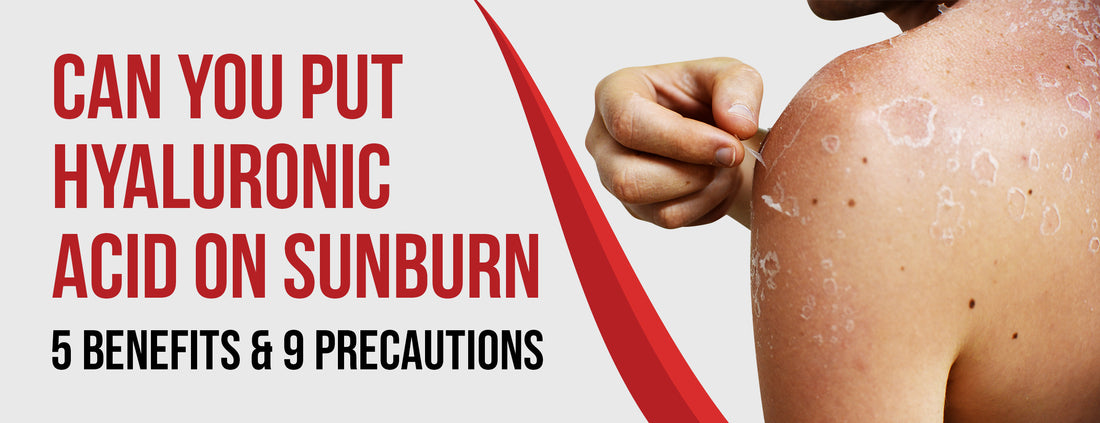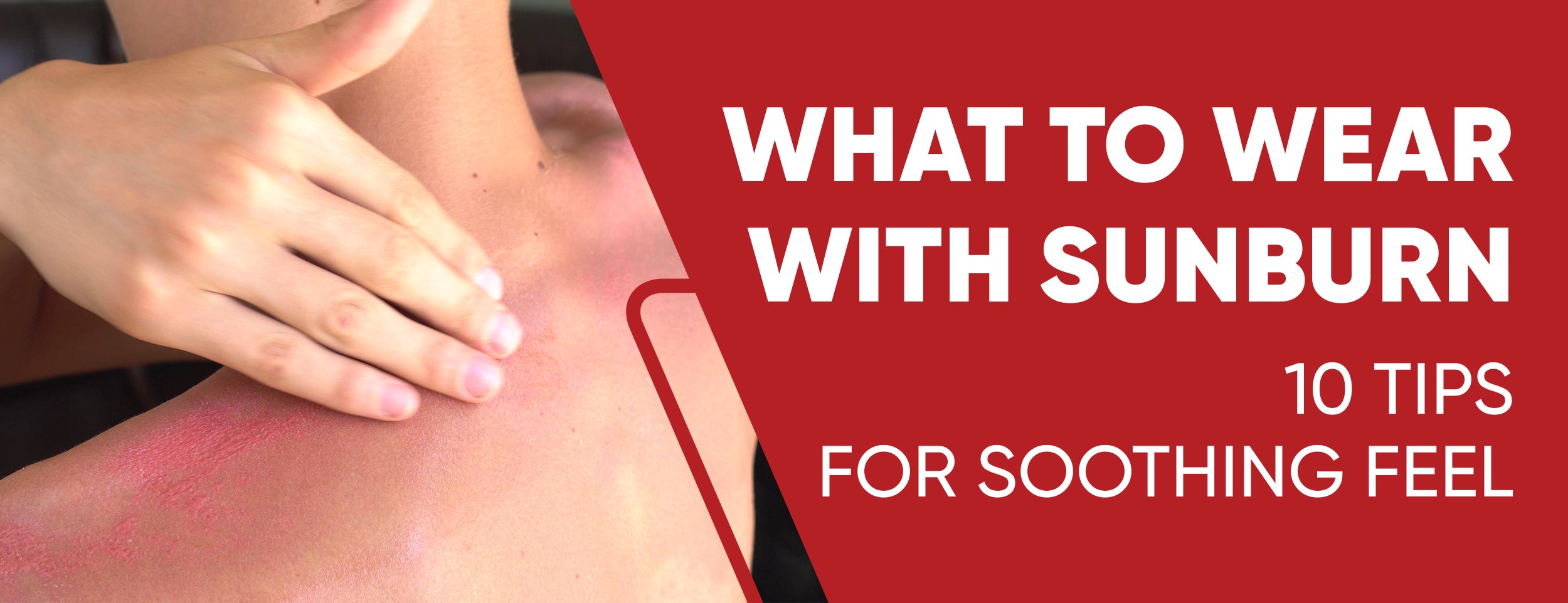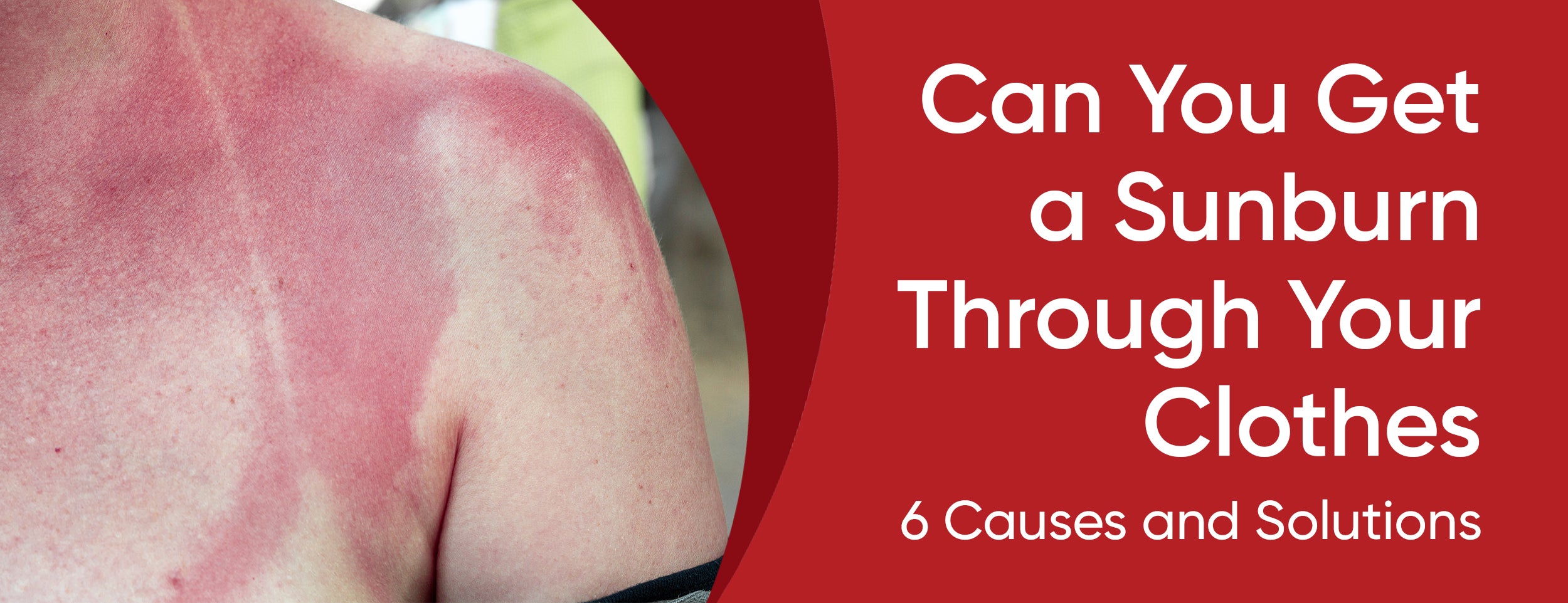When the sun's harsh UV rays wreak havoc on your skin, hyaluronic acid steps in as a soothing savior. It replenishes lost moisture, combating the dryness, flakiness, and peeling that sunburn often brings. Dive into the world of hyaluronic acid and discover its role in sunburn care, along with its benefits and precautions.
Yes. New York City plastic surgeon Melissa Doft, M.D., recommends applying a facial serum infused with hyaluronic acid to help skin heal faster. Hyaluronic acid is a hydrating substance produced by the body.
In this blog post, we will explore whether you can put hyaluronic acid on sunburn, the benefits of hyaluronic acid, and side effects.
Can You Put Hyaluronic Acid on Sunburn: 5 Benefits

Hyaluronic acid hydrates and naturally plumps skin. When applied topically, it can offer a range of benefits. Here are some advantages:
Moisturizing and Hydrating Sunburnt Skin
Sunburns can leave your skin feeling extremely dry. A good thing about hyaluronic acid is that it can help restore moisture levels to your damaged skin. The hyaluronic acid molecules in your skin can hold up to 1,000 times their weight in water, so they plump up and hydrate your skin, making it appear smoother and more supple.
Reducing Redness and Inflammation
Sunburns can cause your skin to become inflamed, making it appear red and sensitive to the touch. The anti-inflammatory properties of hyaluronic acid can help reduce inflammation and redness, making it an ideal ingredient to soothe sunburns. Your skincare routine can benefit from adding hyaluronic acid to calm your skin and provide it with the relief it needs to heal.
Preventing Further Damage to the Skin
Sunburns can weaken your skin barrier, making your skin more vulnerable to further damage. Hyaluronic acid can help strengthen your skin barrier by replenishing your skin with essential moisture and nutrients. By doing so, hyaluronic acid can help protect your skin from future damage and aid in the healing process of your sunburn.

Immediate Relief
Sunburns can be painful and itchy, but a hyaluronic acid serum or cream can help provide instant relief. Hyaluronic acid can help cool and soothe the skin, relieving some of the pain and discomfort associated with sunburn.
Anti-Aging
The effects of sun damage can accelerate the aging process, resulting in fine lines, wrinkles, and uneven skin tone. By using hyaluronic acid, you can help reduce these signs of aging and maintain a youthful-looking complexion.
6 Side Effects of Using Hyaluronic Acid on Sunburn

While hyaluronic acid is safe to use on the skin, there are a few potential risks to be aware of when using it on sunburned skin. Here are some potential side effects:
- Clogged Pores or Breakouts: Overusing hyaluronic acid or applying it to skin that's already oily or prone to breakouts can lead to clogged pores and acne flare-ups.
- Minor Irritation or Allergic Reactions: While hyaluronic acid is well-tolerated by most skin types, you might experience irritation from applying it to sunburned skin.
- Worsening of Pre-existing Skin Conditions: If you have conditions like eczema, rosacea, or psoriasis, hyaluronic acid exacerbates redness, itching, or other symptoms.
- Increased Sensitivity: Hyaluronic acid can make your skin more sensitive to sunlight, exacerbating your sunburn and increasing your risk of further skin damage.
- Dryness and Flaking: Hyaluronic acid can also dry out your skin and cause flaking, which can be uncomfortable if sunburned.
- Exacerbating Pain: Although hyaluronic acid has soothing properties, it is essential to note that applying it to open sunburn wounds may aggravate pain. Like with any skincare product, use it as per the directions or a dermatologist's advice.
9 Precautions to Take When Applying Hyaluronic Acid to Sunburned Skin

Hyaluronic comes to use on sunburned skin; you need to be careful. While hyaluronic acid can help soothe and calm sunburned skin, it can also have adverse effects if not applied correctly. Here are some precautions you should take when using hyaluronic acid on sunburned skin:
- Check the Severity of Your Sunburn: Before applying any skincare product, it's essential to assess the condition of your sunburn. If you have a severe sunburn, it's best to seek medical advice before using any skincare products.
- Avoid Using Hyaluronic Acid on Open Wounds: If your sunburn has blistered, it's essential to avoid using it over the affected area, as it can cause further irritation and inflammation.
- Use a Gentle Moisturizer First: Applying a gentle moisturizer to your sunburn can help soothe the irritation and reduce inflammation. Once your skin has calmed down, you can then apply hyaluronic acid on top of it to lock in the moisture.
- Apply to Sunscreen: It's crucial to protect your skin from further sun damage, especially if you have a sunburn. You should use sunscreen that has at least SPF 30, and reapply it every 2-3 hours.
- Dilute It: If you're worried about irritation, mix a small amount of hyaluronic acid serum into a plain, unscented moisturizer or aloe vera gel to create a gentler formula.
- Use a Light Hand: You must not pile on the hyaluronic acid! Use a small amount and gently dab it onto your sunburned areas, then wait a few minutes to see if your skin absorbs it before adding more.
- Be Mindful of other Skincare: Don't apply any other harsh or potentially irritating products to your sunburned skin while using hyaluronic acid. Stick to gentle, fragrance-free moisturizers and avoid any actives like retinoids, AHAs/BHAs, or vitamin C until your sunburn has healed.
- Dilute the Product: Hyaluronic acid is typically used in a concentrated form, but it's essential to dilute it before using it on sunburned skin. Mix a small amount of the product with water or aloe vera gel to make it less potent.
- Apply Gently: Sunburned skin is already sensitive, so avoid using harsh or abrasive methods. Use a gentle touch when applying the hyaluronic acid, and avoid rubbing it too vigorously.

Conclusion
Hyaluronic acid can be an effective remedy for treating sunburnt skin. Its hydrating and anti-inflammatory properties make it an excellent choice to soothe the affected area. Remembering that hyaluronic acid should not be used as a replacement for SPF is crucial.
Protecting your skin from harmful UV rays is essential by wearing sunscreen and covering up when necessary. With hyaluronic acid serums incorporated into your daily routine, you can help maintain youthful, hydrated skin all year round.












![How to Cover Sunburn With Makeup: 15 Ideas [Easy Solutions]](http://drnumb.com/cdn/shop/articles/How_to_Cover_Sunburn_With_Makeup__15_Ideas_Easy_Solutions.jpg?v=1705581434)


